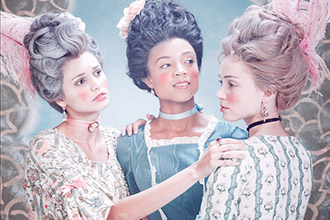
See Don Giovanni on Nov. 10, at 8 PM and Nov. 11, at 2 PM.
Don Giovanni will be presented by Virginia Opera on Saturday, November 10, at 8 P.M. and Sunday, November 11, at 2 P.M. Don Giovanni (complete title: Il dissoluto punito, ossia il Don Giovanni, [literally The Rake Punished, namely Don Giovanni ]) is an opera in two acts with music by Wolfgang Amadeus Mozart and Italian libretto by Lorenzo Da Ponte. It is based on the legends of Don Juan, a fictional libertine and seducer.
Don Giovanni was premiered by the Prague Italian opera at the National Theater (of Bohemia), now called the Estates Theatre, on October 29, 1787. Da Ponte's libretto was billed as a dramma giocoso, a common designation of its time that denotes a mixing of serious and comic action. Mozart entered the work into his catalogue as an opera buffa. Although sometimes classified as comic, it blends comedy, melodrama, and supernatural elements (see Stone Guest below).
DID YOU KNOW... The opera was commissioned as a result of the overwhelming success of Mozart's trip to Prague in January and February 1787? The subject matter may have been chosen in consideration of the long history of Don Juan operas in Prague. The libretto of Lorenzo Da Ponte was based closely on a libretto by Giovanni Bertati for the opera Don Giovanni Tenorio (first performed in Venice early in 1787), although Da Ponte was loath to admit this in memoirs written decades later.
DID YOU KNOW... Don Juan, the fictitious character who is a symbol of libertinism, originated in popular legend and was first given literary personality in 1630 in the tragic drama El burlador de Sevilla (“The Seducer of Seville,” translated in The Trickster of Seville and the Stone Guest), attributed to the Spanish dramatist Tirso de Molina? (The Stone Guest is reference to the stone statue that comes alive and brings about Giovanni’s demise.) Through Tirso’s tragedy, Don Juan became an archetypical character in the West, as familiar as Don Quixote, Hamlet, and Faust. Subsequently, he became the hero-villain of plays, novels, and poems; his legend was assured enduring popularity through Mozart’s opera Don Giovanni, and it would continue to live on, by the 20th century, in movies and other media.
DID YOU KNOW... Don Giovanni was ninth on the Operabase list of the most-performed operas worldwide for the five seasons 2011/2012 through 2015/2016? It has also proved to be a fruitful subject for writers and philosophers. The sustained popularity of Don Giovanni has resulted in extensive borrowings and arrangements of the original. The most famous, and probably most musically substantial, is the operatic fantasy, Réminiscences de Don Juan by Franz Liszt. The minuet from the finale of Act 1, transcribed by Moritz Moszkowski, also makes an incongruous appearance in the manuscript of Liszt's Fantasy on Themes from Mozart's Marriage of Figaro and Don Giovanni. Pyotr Ilyich Tchaikovsky always regarded Don Giovanni – and its composer – with awe. In 1855, Mozart's original manuscript had been purchased in London by the mezzo-soprano Pauline Viardot, who was the teacher of Tchaikovsky's one-time unofficial fiancée Désirée Artôt (whom Viardot may have persuaded not to go through with her plan to marry the composer). Viardot kept the manuscript in a shrine in her Paris home, where it was visited by many people. Tchaikovsky visited her when he was in Paris in June 1886, and said that when looking at the manuscript, he was "in the presence of divinity." So it is not surprising that the centenary of the opera in 1887 would inspire him to write something honoring Mozart. Instead of taking any themes from Don Giovanni, however, he took four lesser known works by Mozart and arranged them into his fourth orchestral suite, which he called Mozartiana. The baritone who sang the title role in the centenary performance of Don Giovanni in Prague that year was Mariano Padilla y Ramos, the man Désirée Artôt married instead of Tchaikovsky.
DID YOU KNOW... Wolfgang Amadeus Mozart (1756–1791) is considered one of the greatest composers of the classical period? He studied and admired the works of Bach, Handel and Haydn, and by the age of 6 was writing his own compositions. He wrote his first opera, Mitridate Re di Ponto, in 1770 when he was only 14 years old. While visiting the Vatican, Mozart heard Gregorio Allegri’s Miserere performed in the Sistine Chapel and he was able to write out the entire score from memory. Previously, the music had not been reproduced outside the Vatican. In April 1787, Beethoven, then aged 16, went to Vienna to get two weeks-worth of music lessons from Mozart.
